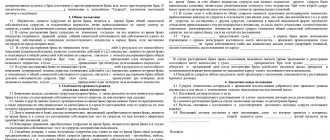The law does not prohibit the purchase and sale of an apartment with debts. Let's imagine a situation: you have found housing that suits you in all respects: price, condition, location. Later it turned out that there was a long tail of debt behind the apartment. Here it is important to understand which debts you will have to answer for, and which legally remain with the former owners.
Are debts transferred to the buyer when purchasing an apartment?
When a purchase and sale transaction is completed, debts are not written off, but are distributed between the seller and the buyer. Some remain with the former owner, others are transferred to the new one. How to understand what the buyer should pay for and what not, let’s figure it out.
- Debts for utility bills. Housing and communal services include: electricity, gas, water supply and sewerage, general house maintenance and heating. By law, the person who uses or used them must pay for them. If the tenant does not pay, then debts accumulate for him and only him. Simply put, all debts of the seller for utilities remain on his conscience and responsibility. Old debts do not apply to the buyer.
- Debts for major repairs. These payments are an exception to the rule. By law, contributions for major repairs are assigned not to a specific person, but to the property. Therefore, if the housing has debts for major repairs, they are transferred to the buyer along with the apartment. And they must be paid by the person who currently owns the property.
What are the consequences of buying an apartment with debts?
- You'll have to pay from your own. For major repairs, for sure, if you did not check the existence of debts in time, then the debts will be yours. Another thing is non-payment of utility bills. Despite the fact that by law they remain with the previous owner, not all buyers know this. Having bought an apartment with debts, some new owners go to repay other people's debts, thinking that this is how it should be. And someone cannot find a seller and also pays not for their “sins”.
- Unpleasant relationship with the management company. There are often cases when utility companies, seeing that they can’t get anything from the previous owner-debtor, switch to new tenants. And they begin to demand immediate repayment from them. They may threaten to refuse to re-register the account to a new person or even go to court.
Important! All such demands from the management company or HOA are illegal and can be considered extortion. Don't be afraid and follow the lead of the utility companies.
In order for the management company to stop pestering you, you need to submit an application demanding to stop issuing invoices for other people’s debts. Attach a copy of the purchase and sale agreement and the apartment acceptance certificate to the application, if information about taking readings from the meter is written there. If the Criminal Code does not stop sending letters, then you can safely contact the prosecutor’s office or court.
- The transaction may be declared invalid. In the event that the apartment could not be sold by law. And the former owner was able to complete the deal. The fact is that if a person does not pay his bills for a long time, the management company can turn to bailiffs. And the executors have the right to seize the housing. Then all actions with him from that moment on will be considered invalid. And the deal can be terminated in court. And if the documents at its conclusion were drawn up not in favor of the buyer, then you can spend a very long time trying to get the money back or not receive it at all.
To avoid getting into such unpleasant situations, you need to understand in time whether there are debts. You can find out by checking it yourself. Because sometimes even realtors, seeing the buyer’s frivolity, can hide the truth about debts.
Who will pay for utilities and who will not?
Registration at the place of residence in itself does not mean that a person is obliged to pay for utilities, the Supreme Court recalled in one of the recent cases. In it, the “Building Operations Directorate” collected about 200,000 rubles. debt for 2011–2015 not only from the owner of the apartment Leonid Pokoev*, but also from its former owner Yuri Voinovich*, from his wife Svetlana Ivanovskikh*. They were both registered in the apartment in 2011, when Voinovich divorced his wife and sold the house to Pokoev. Debts began to accumulate. The former spouses were never discharged for an unknown reason. However, in 2012, the court, at the initiative of the buyer, recognized that they had no reason to be registered.
This led the Moscow Regional Court to the conclusion that all three must pay the debts for the communal apartment. The former spouses were registered in the apartment, did not check out of it, and did not notify the plaintiff of their non-residence, the appeal listed. The Supreme Court did not agree with this, which indicated that registration alone was not enough to satisfy the claim. In doing so, he referred to Art. 153 of the Housing Code, which contains a closed list of persons obliged to pay for the maintenance of the apartment. These are owners, tenants, tenants, members of housing cooperatives, the developer and the buyer of the apartment. In addition, capable and partially capable members of his family, including former ones, pay jointly with the owner if they retain the right to use the residential premises (clause 29 of Plenum Resolution No. 22 of June 27, 2021). In addition, the appeal did not take into account the decision of the court, which recognized that the ex-spouses had no reason to be registered, as set out in determination No. 4-КГ18-35.
Who should pay for utilities? Owners, tenants under a social tenancy agreement, tenants, members of housing cooperatives, shareholders and developers (Article 53 of the Housing Code).
Owners pay rent for housing regardless of whether they are registered there or live there. Active and partially capable members of his family, including former ones, pay jointly with them, if they retain the right to use the residential premises.
Owners and family members: everyone is responsible
The Supreme Court recalled the closed list of persons who must pay for housing and communal services, draws attention to the project manager of the Bureau of Chartered Attorneys “Freitak and Sons” Viktor Spesivov. “If the same people lived in the apartment and were not evicted contrary to the court’s decision, it would still be impossible to collect debts for the utility bills directly from them,” explains the lawyer. “Instead, the owner must pay for the services himself and then sue for damages.”
- It has happened and it has passed: is it possible to exclude old debts for utilities from payments?
November 20, 11:18 - Life hack for a defaulter: the court explained when services will not be disconnected for non-payment of utilities
April 26, 9:12
According to the appeal, damages can be recovered from those who registered in the apartment, but did not notify the owner that they did not live there. This approach actually occurs in judicial practice. But it is used if it is not known for certain whether a person lived in an apartment or not - mainly to tenants and tenants, notes Spesivov. In the same case, the court found that the former spouses did not actually live in the apartment. In addition, a conscientious owner should have been aware of who lived on his square meters, says Spesivov.
It's not just the owner who has to pay for utilities. Jointly with him, this responsibility is borne by other family members, including former ones, who retained the right to use the residential premises (clause 29 of the resolution of the Plenum of the Supreme Court of June 27, 2021 No. 22). If the owner does not pay, it is better to sue not only him, but also his household members in solidarity: this way there is a higher chance of getting at least something. For example, in case No. 2-949/2018, Gazprom Mezhregiongaz Ufa recovered a debt for gas and penalties not only from the owner of the property, but also from two adult sons who were registered there.
Spesivov advises plaintiffs in such cases to prove that the defendants actually lived in the apartment or had the right to live in it. The defendants, on the contrary, must prove that they did not live and did not have the right to live there.
If the defendants cannot prove that they lived in another place, but convince the court that they had no obligation to pay for utilities, this will at least help them stall for time. The owner of the apartment will have to pay everything himself, and then file a new claim against them.
Project Manager of the Bureau of Chartered Attorneys "Freitak and Sons" Viktor Spesivov
If the previous owner and his family members are not deregistered, they can be forced to do this through the court, reminds Althaus Legal Advisor Susana Kirakosyan. And in order to prevent such a situation, she recommends including in the purchase and sale agreement a condition that the seller and other persons who live in the apartment must check out of it. It is worthwhile to provide for liability for failure to fulfill this obligation, says Kirakosyan.
Owners and shareholders: how not to overpay
The home buyer is required to pay utility bills when he takes possession of his property. Whether to count this period from the date of conclusion of the purchase and sale agreement or from the date of its registration was decided by the courts in the case of Nikolai Borshchevich*. He signed the agreement on April 11, 2021, and was registered in the Unified State Register of Real Estate on May 4, 2021. Gazprom Mezhregiongaz St. Petersburg filed a lawsuit to recover payments, including for this month. The Leningradsky District Court of Kaliningrad satisfied this requirement. Borshchevich must pay from the moment the property is transferred, the first instance decided. The registration of an apartment is of a declarative nature, the court explained.
- The Supreme Court figured out who owns the city garbage
February 8, 12:14 - Provider vs. HOA: Do I need to pay for wires on the roof of the house
May 28, 9:47 - How to properly conduct a meeting of homeowners: step-by-step instructions
February 9, 13:08 - Same different prices: disadvantage of two-part tariff
March 1, 16:55 - Will be done: how a management company can carry out work under a court decision
March 7, 9:20
The Kaliningrad Regional Court did not agree with this, and released Borshchevich from paying for the disputed period. The right of ownership of real estate arises from the moment of state registration, the appeal recalled. At the same time, the owner did not delay registration in order to avoid paying for the “utilities” longer: he submitted the documents three days after signing the purchase and sale agreement, as noted in determination No. 33 – 1836/2018.
Owners pay only from the moment of registration of ownership, but the court of first instance applied the rule as for a shareholder in a new building, explains Yuri Netreba, head of the judicial protection department of MCA Arbat. According to him, the special regulation for shareholders is explained by the fact that they can receive the keys under a transfer deed when the act of putting the house into operation has not yet been signed, which means it is impossible to issue a certificate of ownership. At the same time, residents are making repairs, using heating, water, an elevator, and electricity, Netreba continues. This means that they actually own the apartment and must pay for maintenance: such changes were included in sub-clause in 2011. 6 paragraph 2 art. 153 LCD.
And in 2015 a subsection appeared. 7 of the same paragraph. He obliged the developer to pay for the maintenance of all premises that were put into operation but not transferred under the deed. For example, in case No. A32-23585/2017, the courts ordered Rosmontazh to pay Kubanzhilupravleniya utilities for apartments that the company did not manage to sell. But not all developers want to bear this maintenance burden. In an effort to cut costs, some of them ask clients to pay “utilities” for an apartment that has not yet been received.
The company may ask the owner to sign some kind of paper about the obligation to pay for utilities before he receives the keys. Often this proposal is accompanied by threats. We must be wary of this: it is better not to pay anything. However, after this the developer may interfere with obtaining an apartment.
Lawyer of MKA Arbat Sergey Sergeev
* – the names and surnames of the characters have been changed.
- Evgenia Efimenko
How can you find out about debts yourself?
- Ask the seller. Before buying an apartment, along with other documents, be sure to ask its owner for a certificate of no debt. Both for utilities and for major repairs. According to the civil code, the buyer has the right to familiarize himself with all the terms of the transaction.
- Read the contract carefully. Many people forget the simple rule that you should not sign a document without reading it. And sellers take advantage of this. They can indicate in an official document that all utility debts are transferred to the new owner. If you don’t notice this and sign the document, you will have to pay.
- Contact the management company. If the seller assures that he is not a debtor. It’s definitely worth double-checking this with utility companies, the ERC, resource suppliers, or the capital repair fund.
Important! Some data can only be obtained with the consent of the seller. Therefore, if he refuses to help you, you should think before purchasing this apartment.
- Through the UK website. Sometimes information about debtors is posted there. In addition, in some regions such data can be found on the portals of housing and communal services departments.
Additional information. It would not be superfluous to run the seller through the bailiff database and find out how much debt he has. A complete debt check can be done using the ChekPerson.ru in just a few clicks. In addition, you can find out whether there are encumbrances on the apartment by receiving one single document - an extract from the Unified State Register of Real Estate. The paper will show the history of the property owners, its characteristics in more detail, as well as all the information about whether the property has been seized. You can receive this document within a few hours. By indicating the address or cadastral number of the apartment on the EGRN.Reestr website.
Encumbrances on an apartment with debts
An apartment with debts may be subject to encumbrances - restrictions on sales and other real estate transactions. This is unlikely to be caused by utility debts, but the very fact of their existence may indicate a difficult financial situation for the seller. It would not be superfluous to check whether the apartment is pledged to the bank, whether restrictions are imposed on the sale due to non-payment of alimony or bankruptcy proceedings.
You can find out whether there are encumbrances on the apartment caused by debts by receiving one single document - an extract from the Unified State Register of Real Estate . The paper will contain the history of the homeowners, its address, cadastral number, area, cost, as well as information about restrictions on sale.
View a sample USRN extract
Information about encumbrances will be available in the statement “On characteristics and rights”, the cost of which is 200 rubles. In addition to information about the pledge and the ban on re-registration, it includes characteristics of the property, information about the current owner and cadastral value. By the way, the extract will reflect not only the fact of the restrictions, but also information about who imposed them: bailiff, bank, tax office, etc. In the full extract, you will be able to get a complete history of the owners with the dates of transfer and termination of rights.
You can receive your statement within a few hours. By indicating the address or cadastral number of the apartment on the website or in the EGRN.Reestr . You can pay for the service in any convenient way.
The received extract will be certified by the electronic signature of Rosreestr. This means that it can be sent to a bank, court or other government agency, which will accept it as if it were a paper document with a seal.
If you see restrictions on the sale in the statement (except for a mortgage ), it is better to refuse the transaction or contact a lawyer. After all, this may lead to the fact that the transaction simply will not be registered or will be challenged in a few years.
If housing is pledged
This situation is much worse: a debt on a bank loan can lead to the loss of a mortgaged house or apartment, even if this is the only housing for the owner and his family members.
The law makes only one exception from the general prohibition on taking away the only housing for debts - this is a pledge (Article 446 of the Code of Civil Procedure of the Russian Federation). Eviction threatens both the owner himself and everyone who lives in his apartment.
For example, a son bought his mother a one-room apartment with a mortgage, registered the property in his own name, and an elderly woman lived there alone. But a few years later, the son’s financial situation worsened, a loan debt arose - and soon the apartment was sold at public auction, and the new owner managed to evict the mother.
What protective measures can be taken if the bank takes away the apartment for debts?
Firstly, you need to take into account that mortgaged housing can only be put up for sale by a court decision. But the court will not make such a decision if the loan debt is less than 5% of the cost of housing or payments are overdue by less than 3 months (Article 54.1 of Law No. 102-FZ).
Secondly, if the court nevertheless decided to sell the mortgaged apartment at public auction, those evicted have the right to demand that the municipal administration provide them with housing from the maneuverable fund (Article 95 of the Housing Code of the Russian Federation).
In judicial practice there are positive decisions on such claims (for example, the decision of the Central District Court of Volgograd, case No. 2-6303/16).
What to do if the apartment has debts?
If the seller honestly admitted that he did not pay the bills. Or you found out this during the inspection, but do not want to lose this apartment. Then we can come to an agreement. But be sure to include all actions in the purchase and sale agreement.
- The seller pays himself. The best decision would be to ask the owner to pay all debts before the transaction is completed. This is especially true for contributions for major repairs. You can conclude an agreement and indicate that both parties will wait for each other. The seller will not sell the property to third parties, and the buyer will not switch to other apartments. Or offer the owner to pay the debts with money from the advance payment. The main thing is to write everything down in the purchase and sale agreement or in the advance payment agreement .
- Debts pass to the buyer. In this case, the seller can make a discount on the amount that the buyer will pay for the debts of the former owner. Again, all these actions will need to be specified in the purchase and sale agreement.
Important! The discount amount must be indicated not as part of the total cost, but as a separate line. If suddenly the deal is challenged in court, then it will be easier to prove that it was the buyer who paid for the utilities and he will have to be reimbursed for the debts of others.
If you couldn’t come to an agreement with the seller, you should still refuse the purchase. Because, as already written above, utility payments will remain with the seller. And major repairs will legally go to the buyer. Moreover, some residents do not pay for this service for years and as a result, considerable sums accumulate.
Text: Ksenia Antonova, Elizaveta Pastukhova
If housing was donated
An apartment or house received as a gift can be taken to pay off the donor’s debts. The court may invalidate the gift agreement if:
- it was committed within a 3-year period before the debtor filed a bankruptcy petition (Article 61.2 of Law No. 127-FZ);
- or it is proven that the donation was made only for appearances in order to hide the property from collection. A transaction can be canceled on this basis within 3 years from the date of its execution. And if the plaintiff learned about the donation later, then the donated housing can be taken away within a 10-year period from the date of donation (Article 181 of the Civil Code of the Russian Federation).
You can protect yourself from the seizure of donated housing if you prove that the donation was made in reality, and not with the aim of making it impossible to collect the debt from the donor.
For example, it is confirmed that the donor has ceased to own the property and now the donee is exercising his powers as an owner: he lives in the apartment, pays utility bills, taxes, etc. (see, for example, the decision of the Kyzyl District Court of the Republic of Tyva, case No. 2-1153/ 2015).
VAT – 2022
The best speaker on tax topics, , will prepare you for filing your return on January 14 . There are 10 out of 40 places left for the online workshop . The flow is limited, as there will be live communication with the teacher live. Hurry up to get into the group. Sign up>>>









